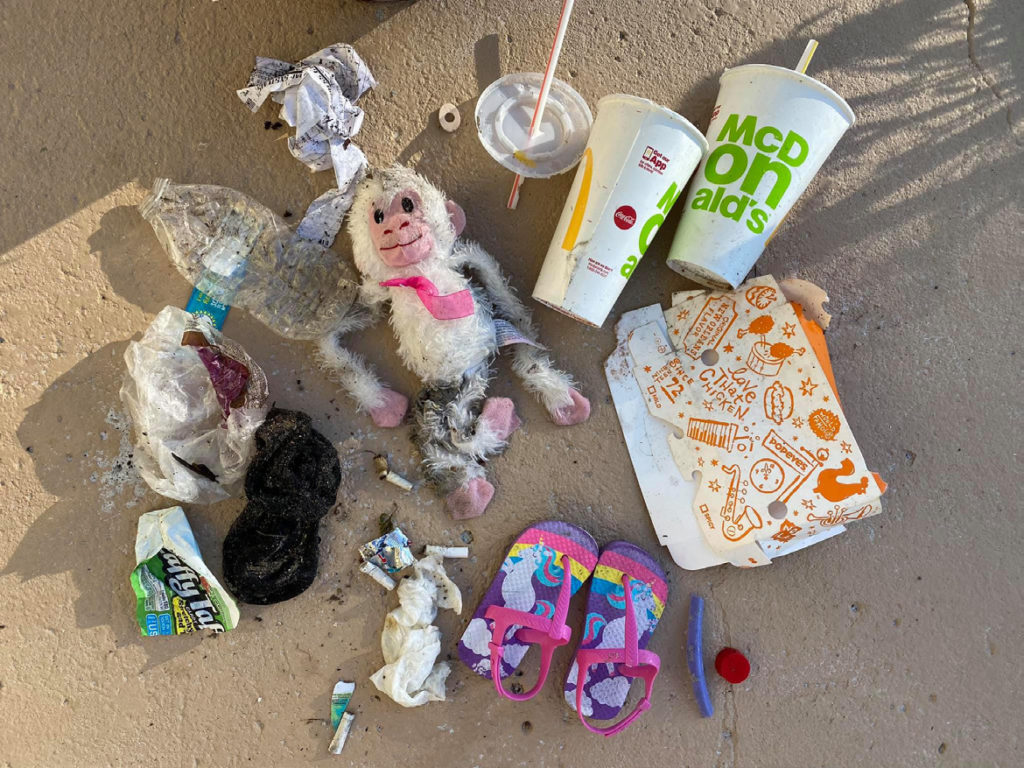Pictured Above: After walking just a few blocks from her apartment, Annalise Anderson’s bag was overflowing with trash from the sidewalks of Old Northeast and Beach Drive.
Annalise Anderson | The Crow’s Nest
By Annalise Anderson
St. Petersburg residents are fortunate to claim that they live where other people vacation. But if wide-eyed Northerners redirected their selfie sticks and acclimated locals watched the ground instead of their phones, they would quickly realize that this tropical paradise is – quite literally – trashed.
After noticing excessive amounts of litter in my neighborhood, I’ve made trash bags and rubber gloves the new must-have accessories for my regular walkabouts. Usually, I don’t make it more than a few blocks without my bag overflowing with trash like empty bottles, plastic wrappers and used facemasks.
Thanks to other committed residents, I’m not alone in my garbage-picking efforts.
Judithanne Scourfield McLauchlan, USF associate professor of political science and founding director of Center for Civic Engagement on the St. Petersburg campus, is newly dedicated to cleaning up local beaches.

Courtesy of Judithanne Scourfield McLauchlan
McLauchlan’s New Year’s resolution is to take daily beach walks to appreciate nature, get exercise and clear litter from the sand and gulf. At time of this writing, she has visited the beach 72 days and has collected more than 242 pounds of trash since January 1.
McLauchlan shares her trash hauls on her blog Mclauchlans Madbch Clean Up and uses hashtags #KeepPinellasBeauitful, #PickUpPinellas, #TrashTagChallenge and #DoBeautifulThings to help spread the word.
“I hope that other people will be inspired to make a difference, as well,” McLauchlan said. “If I do nothing else today, I probably saved a couple fish and birds from having these baggies in their stomachs. We can’t save the whole world and the whole ocean of all these plastics, but each of us individually can make an impact by doing what we can. So, every straw I pick up, every bottle cap I pick up, is one less that’s in the ocean right now.”
McLauchlan’s cleanups have turned into a plethora of “side projects.” After carrying the litter home, she sorts and saves certain items, like children’s beach toys and firework remnants, to upcycle in various ways.
She plans to create and sell artworks made of upcycled items to fundraise for local conservation efforts. A rainbow mosaic made from plastic bits in celebration of Gay Pride Month is on her to-do list.
St. Petersburg resident Andrew Harlan has also been taking action. For him, cleaning up litter is “just a habit” that his grandmother helped to instill.
“It’s something that I’ve always done,” Harlan said in an email to The Crow’s Nest. “I walk anywhere from six to 10 miles per day, both for work and for exercise/walking my dog. I always have my gloves on me, even if I’m just out to put small items back in containers around Central Avenue.”
Though he doesn’t believe local litter culprits act out of malice, Harlan struggles to estimate the amount of trash he’s cleared from city streets.
“I couldn’t even begin to come up with a number. It’s a lot,” Harlan said. “I could fill up three Hefty trash bags on just one walk downtown. On a recent cleanup in the Warehouse Arts District I filled, dumped and refilled my tote bag eight times.”
At the start of the COVID-19 pandemic, Harlan made a conscious effort to post his cleanups on social media to encourage others to do the same.
“I just hate seeing so much litter around our beautiful parks and around our small businesses downtown,” Harlan said. “If you love this city, if you love our businesses and our parks and the plants and animals that make the Sunshine City shine, then do your part to keep it neat. If you pick up even just three pieces of litter a day, you’d be making a major difference.”
To those interested in getting involved, Harlan advises, “Don’t wait… All it takes is a pair of gloves to get out and start cleaning.”
Emma Jacobs, a USF St. Petersburg senior majoring in environmental science and policy with a concentration in sustainability, knows that litter poses a significant risk to more than just the city’s cosmetic beauty.
“Litter and pollution are much larger issues than a non-aesthetically pleasing cityscape scattered with garbage,” Jacobs said in an email to The Crow’s Nest. “If St. Pete residents value our natural habitats, wildlife and waterfront areas, they should care about keeping our city clean. One piece of litter may start as a plastic bag on the side of the road, but could, over time, end up in the ocean harming marine life like sea turtles, fish and manatees.
“This issue is greater than the potential inconvenience of picking up litter that we as humans put there in the first place. This is about taking responsibility for a problem we collectively caused.”
Jacobs emphasized that young people wield the power to spark change in their communities.
“Young people are changemakers across the globe that are in a unique position to build and catalyze movements,” Jacobs said. “By educating ourselves and our peers, we can build a culture of environmental stewardship that will ultimately help us and our planet.”
While I can’t explain when, why or how St. Petersburg became an extension of the world’s trash cans, I know that I can do my part as a resident by picking up litter, educating others and scolding those who flick cigarette butts on the ground.
No matter where we call home, it’s our undeniable responsibility to help keep our communities clean.
I’ll step down from my upcycled soapbox now.



